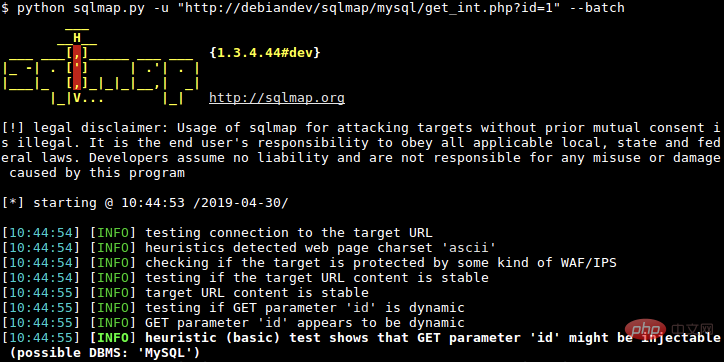
很长一段时间,我认为后端开发,在安全性方面最容易出问题的地方就在于SQL注入。通过 where 1=1这种魔幻的SQL写法,就可以很容易的对一个存在问题的系统进行攻击,以至于最终演进出sqlmap这样的神器存在。

后来的fastjson刷新了我的认知,这个框架也算是对互联网安全概念的一种推动。连不懂技术的老板,都知道fastjson快的要命,作为程序员安全理念就得到了一次提升。
推荐(免费):sql
为什么对sql注入情有独钟?因为开发人员和SQL打交道的地方太多了。甚至有的专门开发报表的同学,写的SQL行数,比写的代码行数还多!
问题是。很久很久之前,早在10年前,就有人在喊SQL注入已经死掉了,但时至今日,依然有一大批的SQL注入教程和SQL注入的案例。
SQL注入是漏洞之王,这可不是吹的。
当然在这方面,PHP的贡献最大,Java甘拜下风。
SQL注入流行的原因,就是开发人员对自己太自信了,或者使用的工具太原始了,没有经过框架层进行一次过滤。如果你用了Java界的MyBatis或者JPA,发生SQL注入的可能性就变的非常的低。现在PHP也有了类似于thinkphp一样的框架,代表着能搞的SQL注入漏洞已经越来越少了。
但不代表着没有,只是门槛提高了。我们以MyBatis为例,看一下到底还能不能发生SQL注入。
MyBatis依然存在SQL注入
使用Mybatis的同学,第一个接触的概念,就是#和$的区别。这两个符号非常的像Shell中的魔幻符号,但好在只有两种情况。
# 代表的是使用sql预编译方式,安全可靠
$ 代表着使用的是拼接方式,有SQL注入的风险
比如下面这个xml配置,就是一个绝对安全的写法。因为整个#{id}会被替换成?。
<select id="queryAll" resultMap="resultMap">
SELECT * FROM order WHERE id = #{id}
</select>但可惜的是,有些场景,并不能使用预编译方式(或者你仅仅是不知道或者懒)。像一些代码重构,把表名/列名/排序等字段,动态传入的时候,不可避免的就需要SQL拼接的方式,SQL注入依然有搞头。
但更容易发生问题的,还是LIKE和IN等类似的语句。
下面是两句Like模糊查询的写法,实际测试会发现,使用#竟然不好使了,会报错,需要使用sql拼接的$。问题由此发生。
SELECT * FROM order WHERE name like '%#{name}%' //会报语法错
SELECT * FROM order WHERE name like '%${name}%' //可以运行而正确的写法,应该使用函数拼接。但是工期压死人,在不知不觉间,大多数人就选择了简单的写法。毕竟功能第一嘛,也是体现工作量的最主要方式。
SELECT * FROM order WHERE name like concat(‘%’,#{name}, ‘%’) //正确的写法同样的问题,存在于IN语句。
in (#{tag}) //报错
in (${tag}) //可以运行既然几个字符就可以运行,当然没人选择下面复杂的写法。
tag in
<foreach collection="tag" item="item" open="("separatosr="," close=")">
#{tag}
</foreach>还有order by,也千万不要掉以轻心,一不小心就会万劫不复。
SELECT * FROM order order by createDate #{sortType} //报错
SELECT * FROM order order by createDate ${sortType} //正常这种情况下,就需要把sortType搞成白名单了。不就一个ASC和DESC了,你给我传一个长长的串,是怎么回事?
总结
SQL注入在2021年,依然存在,只不过门槛提高了。现在SQL注入减少,都是框架的功劳,和程序员的水平没半毛关系。sql拼接的情况永远不会消失,因为这是最快捷简单的方式,会让人欲罢不能。无数的外包项目,十几年躺尸不动的系统比比皆是,寄希望于在框架层全部消灭SQL注入,是一个梦想。
因为它的对手,是人性的懒惰。谁也无法战胜它。
以上就是确定SQL注入死透了么?的详细内容,更多请关注php中文网其它相关文章!

每个人都需要一台速度更快、更稳定的 PC。随着时间的推移,垃圾文件、旧注册表数据和不必要的后台进程会占用资源并降低性能。幸运的是,许多工具可以让 Windows 保持平稳运行。

Copyright 2014-2025 //m.sbmmt.com/ All Rights Reserved | php.cn | 湘ICP备2023035733号